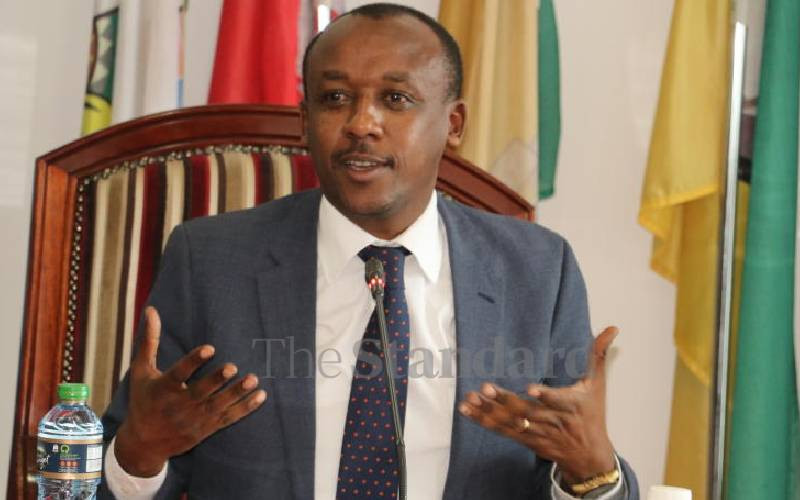To the average Kenyan struggling to survive under the present circumstances where unemployment is soaring and prices of commodities going up, there is little time to worry about the state of the nation.
People believe the destiny of our country is in the able hands of our elected leaders.
But the reality is different. Corruption has not just become the order of the day but is growing.
Institutions with the mandate to monitor and curb corruption are compromised and the public no longer has faith in them.
Ethnicity is shamelessly being entrenched in public institutions to the extent that whenever vacancies occur people know the unstated criteria to land the job is one's ethnic origin.
The same goes for those who are awarded lucrative tenders.
Impunity is so rampant that even children now know that the law is applied selectively.
Insecurity in all parts of the country has inevitably created a sense of uncertainty. Some parts of the country like Mandera are experiencing severe shortages of staff in sectors such as education, health and agriculture because non-indigenous members of staff are reluctant to report for duty.
It doesn't help that some of the staff deployed in those areas are there because they have disciplinary cases.
Traditionally, civil servants who had disciplinary cases, which could not justify dismissal, were posted to such areas.
Though the devolved system of government is the best hope for Kenyans, especially those who have been marginalised, little progress has been realised so far.
This is because key players, including governors and Members of County Assemblies (some call them financially elevated councillors) are preoccupied with jostling for power; not to deliver much-needed services, but to amass wealth.
Corruption leads to lawlessness and despair for those who cannot bribe. Lack of visionary political leadership and outright discrimination are a recipe for social disintegration.
Kenya is now at a crossroads and the choice is either to restore sanity in management of State affairs and enhance the spirit of nationhood or fall into the political abyss of “we versus them”.
The solution can only come from religious organisations who are yet to play their role effectively.
Stay informed. Subscribe to our newsletter
The challenge is for religious bodies to sanitise the society and stop being partisan.
Even in biblical history, nations that lost direction and fell into paganism were rescued by prophets.
To most observers it defeats reason to see religious organisations being either partisan or completely unconcerned with issues of critical concern to well-being of the nation.
Devoted Christians and Muslims collectively have a following of up to 90 per cent of the population.
With such a high percentage of the citizen population, these two religions can mobilise their followers to demand total adherence to the constitution.
Religious leaders should consider organising a national conference that will bring together experts to deliberate and recommend ways out of the problems we are currently experiencing in our country.
The new constitution is clear on what measures Kenyans can take to safeguard their sovereignty and pride legally.
The civil society is active, but it lacks the institutional structures of religious organisations.
Joint efforts by groups of religious leaders can determine issues that require either major changes or complete overhauling through referendums.
Despite the accolades, the problem with our religious leadership is that they want to sit in comfort with the powers that be for personal gain.
In the history of mankind, except in the case of ancient Israel when King David and his son Solomon were true servants of God, religious leaders being the moral champions for society have never been bed fellows with those in power for obvious reasons.
By virtue of their devotion to the principle of equality and justice, religious leaders including Jesus Christ, sided with the weak or the poor who are always the majority.
The fact that they identify themselves with the down-trodden makes them less friendly to those in power. This is because power does not only corrupt, but it blinds those who wield power.
Time is ripe for the religious leaders to wake up and restore national values.
 The Standard Group Plc is a
multi-media organization with investments in media platforms spanning newspaper
print operations, television, radio broadcasting, digital and online services. The
Standard Group is recognized as a leading multi-media house in Kenya with a key
influence in matters of national and international interest.
The Standard Group Plc is a
multi-media organization with investments in media platforms spanning newspaper
print operations, television, radio broadcasting, digital and online services. The
Standard Group is recognized as a leading multi-media house in Kenya with a key
influence in matters of national and international interest.
 The Standard Group Plc is a
multi-media organization with investments in media platforms spanning newspaper
print operations, television, radio broadcasting, digital and online services. The
Standard Group is recognized as a leading multi-media house in Kenya with a key
influence in matters of national and international interest.
The Standard Group Plc is a
multi-media organization with investments in media platforms spanning newspaper
print operations, television, radio broadcasting, digital and online services. The
Standard Group is recognized as a leading multi-media house in Kenya with a key
influence in matters of national and international interest.









